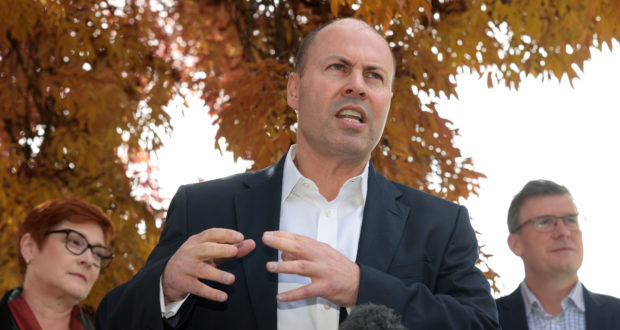The federal budget, which will be handed down on Tuesday, is expected to include a 10 billion package for aged care, which aged care minister Greg Hunt described as "the largest in Australian history".
Treasurer Josh Frydenberg has told the ABC that the government is committed to fixing the sector.
“We’ve had a royal commission which has indicated that the sector is in dire need of reform,” Frydenberg said.
“We have an ageing population and it’s not just about spending more money, it’s also about ensuring that that money is well spent and our focus is on governance, workforce issues, the quality of aged care services.”
The budget is to be the government's official response to the aged care royal commission's final report, which was released in March.
Hunt said: "This will be the most significant investment in aged care in Australian history. And it's our watch and it's our time, and it's our responsibility."
While the $10bn is not an insignificant funding boost, it is expected to be spread over four years and experts believe that this is not enough to fix the system.
The Grattan institute released a report in April which said the government would need to invest $10 bn per year in a bid to bring aged care up to standard.
"The extra spending could be funded by some combination of a new Medicare-style levy on taxable income, changes to the pension assets test and/or the residential aged care means test, and/or reductions in excessively generous tax breaks on superannuation.
"Properly administered, the extra money could transform the aged care system: clearing the 100,000-long waiting list for adequate home care, providing higher-level care at home for longer, employing at least 70,000 more aged care workers, and lifting the amount of care per person and ensuring a qualified nurse is on site 24/7 in all residential care homes," the authors wrote.
United Workers Union Aged Care Director Carolyn Smith likened the figure proposed to a "band aid for a car crash".
“In its final report the Royal Commission found Federal Government funding in 2018-19 was $9.8 billion lower annually than it should be if aged care had been appropriately funded,” Ms Smith said.
“The $10 billion annual funding shortfall is leading to horrendous human costs in aged care, with older Australians left unsafe and vulnerable, and workers left physically and emotionally exhausted."
Early reports suggest that the money would go primarily to reducing home care waiting lists and Smith said he government must use the budget to cover fundamental reforms needed in residential aged care.
“Residential aged care is being run on less than the smell of an oily rag, putting at risk older Australians and those who care for them,” Ms Smith said.
“In home care we welcome the increased funding to address the extensive waiting list.
“But unless we deal with the insecure work and low pay that occurs throughout home care, where are we going to find the extra 16,000 workers required to cut the waiting list by 100,000?
“When is the Federal Government finally going to recognise that a well-staffed, well-trained, adequately-paid workforce is the single biggest driver to providing the quality care time needed by older people in Australia?”
Royal Australasian College of Physicians (RACP) spokesperson and President of the Australian and New Zealand Society for Geriatric Medicine, Dr John Maddison, called the additional $10 billion "disappointing".
Maddison said that key reforms for the interface between aged care and the health system won’t be resolved without more spending to enhance the aged care workforce, improved assessment processes, pathways to access to specialist care and a multi-disciplinary approach to providing healthcare to older people.
“Is $10 billion over four years really going to be enough to resource the kind of system overhaul that would achieve integrated long term healthcare support for older Australians? The Royal Commission itself estimated that successive government cuts had already left a shortfall of almost $10 billion annually," he said.
“Our entire healthcare system needs to shift to more easily integrate into aged care so that people living in aged care residences can access healthcare services and lead a better quality of life.”
The opposition parties are similarly unmoved by the funding increase, with Greens Senator Rachel Siewert tweeting: “$10 billion over four years is not enough to fix our broken aged care system, much more is needed.”
While Labor aged care spokesman Mark Butler said that to respond to all of the recommendations from the royal commission report would cost " way more" than the $10 billion figure.
Do you have an idea for a story?Email [email protected]
 Aged Care Insite Australia's number one aged care news source
Aged Care Insite Australia's number one aged care news source


We may also put pressure on the banks that are closing their branches in most suburbs to be responsible and support the elderly that will continue to be living in the community to access their financial affairs and their money.
Governments should insist on that as a matter of priory as well.